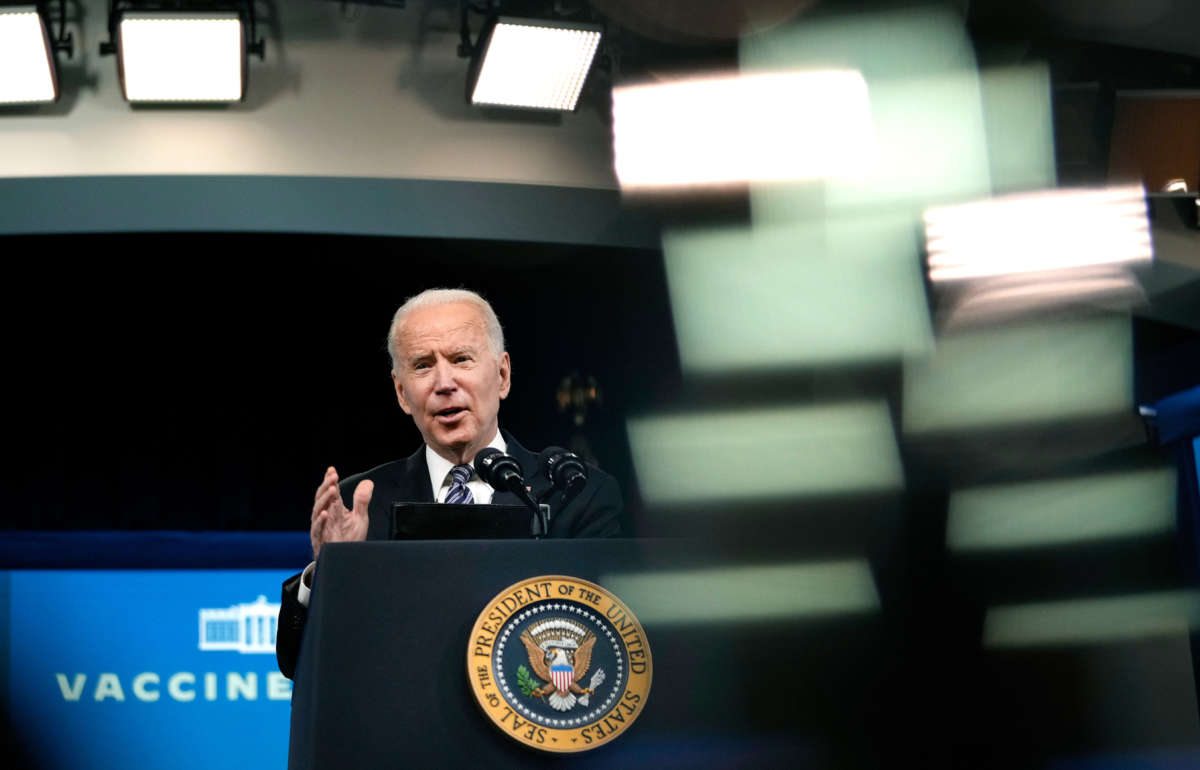Did you know that Truthout is a nonprofit and independently funded by readers like you? If you value what we do, please support our work with a donation.
President Joe Biden announced on Monday that his administration will be sharing 80 million doses of COVID-19 vaccines with other countries, adding 20 million to the total amount of vaccines his administration has already pledged.
Biden said that the U.S. will be giving at least 20 million Pfizer, Moderna and Johnson & Johnson vaccines to other countries via the World Health Organizations’ COVID-19 Vaccines Global Access program, or COVAX. The administration aims to get this batch of vaccines out by the end of June.
“This means, over the next six weeks, the United States of America will send 80 million doses overseas. That represents 13 percent of the vaccines produced by the United States by the end of June,” said Biden. “This will be more vaccines than any country has shared to date.”
Biden had previously pledged 60 million doses of only the AstraZeneca vaccine, after it’s been authorized for use in the U.S., to other countries. Biden said on Monday that the previously pledged doses would be the U.S.’s entire supply of the AstraZeneca vaccine produced domestically.
The White House said that the new pledge pulls the U.S. further ahead of other countries in terms of vaccine sharing agreements. “This is the most doses donated by any country in the world by five times,” said White House Press Secretary Jen Psaki, at a briefing.
The U.S. has so far purchased and reserved enough vaccine doses to cover the entire U.S. population several times over.
The administration also says that the vaccines will be shared with no expectation of repayment. “We will share these vaccines in the service of ending the pandemic everywhere. And we will not use our vaccines to secure favors from other countries,” said Biden.
Andy Slavitt, Biden’s senior COVID advisor, echoed that statement on Twitter, saying that the administration will be “working with COVAX to distribute them equitably and scientifically.” Officials have not yet announced where the vaccines will be distributed, but the administration in March announced it was working out an agreement to share 4 million AstraZeneca vaccines with Canada and Mexico.
Biden has gained some praise from the left for his recent support of the World Trade Organization’s vaccine patent waiver proposal. The patent waivers would allow other countries to manufacture their own vaccines instead of depending upon the largesse of the patent holders. Countries being free to manufacture and distribute their own vaccines would be a crucial step in helping to vaccinate more people around the world and controlling the global pandemic.
Biden’s announcement comes as the U.S.’s vaccine supply has, in recent months, flipped from being too limited to now slowly outpacing demand. Last month, the country’s vaccination rate began to slow, even as vaccine makers kept up with manufacturing.
Local and state governments, in efforts to get more people vaccinated, have begun launching vaccine incentive programs like money rewards or even free beers to people who have gotten their shots. Officials in Ohio last week announced the state would be launching a lottery program for those who have gotten their shots to have a chance at winning $1 million.
In his speech Monday, Biden warned that, if people don’t get vaccinated sooner, cases may continue to rise as variants of the coronavirus spread among the population. The administration is hoping to get at least one jab into 70 percent of U.S. adults by July 4.
Officials have estimated that to reach herd immunity, the fully vaccinated population needs to be between 70 to 90 percent. But this may be difficult as a relatively large portion of the population, including 41 percent of Republicans, according to a new poll, refuse to get their shots.
A terrifying moment. We appeal for your support.
In the last weeks, we have witnessed an authoritarian assault on communities in Minnesota and across the nation.
The need for truthful, grassroots reporting is urgent at this cataclysmic historical moment. Yet, Trump-aligned billionaires and other allies have taken over many legacy media outlets — the culmination of a decades-long campaign to place control of the narrative into the hands of the political right.
We refuse to let Trump’s blatant propaganda machine go unchecked. Untethered to corporate ownership or advertisers, Truthout remains fearless in our reporting and our determination to use journalism as a tool for justice.
But we need your help just to fund our basic expenses. Over 80 percent of Truthout’s funding comes from small individual donations from our community of readers, and over a third of our total budget is supported by recurring monthly donors.
Truthout has launched a fundraiser to add 310 new monthly donors in the next 4 days. Whether you can make a small monthly donation or a larger one-time gift, Truthout only works with your support.
